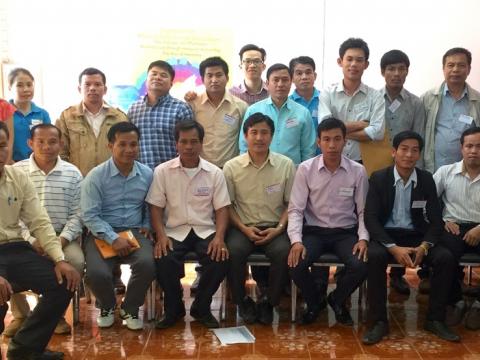A collaborative workshop to strengthen disaster management

On January 12th and 13th, World Vision Humanitarian Emergency Affairs Coordinator and supporting regional staff conducted a Disaster Management workshop in Savannakhet.
The workshop was attended by 8 representatives from the Area Development Programmes (ADP) of Sepone, Atsaphone, Nong, Thabangthong, Xonnabouly, Pathoumpone, Soukhouma, and Mounlapamokak along with government staff from each district. Nonetheless, staff from the Southern Zone National Disaster Management Team and provincial government also participated.
This is the first time many government partners working in disaster management were invited to work closely with World Vision staff on emergency preparedness and planning.
The purpose of the workshop was to teach staff about the principles and functions of the Emergency Management System. This system helps staff understand the roles and responsibilities of everyone involved in disaster response. Furthermore, the workshop aimed to teach World Vision staff and government how to make District Preparedness Plans, plans to prepare and respond to hazards.
District Preparedness Plans allow for the merging of ideas and plans between government and World Vision staff. Both parties share ideas and feed-back in order for the emergency reaction to be valuable, accurate and effective.
“This was my first time attending a disaster management workshop. It was very helpful, especially because it taught my team and I how to make before and after disaster management plans. I learned that these plans are essential when dealing with disasters because it allows us to better prepare, organize reduction efforts and gather resources. I learned how to communicate with the affected communities and how to help them,” said Chansamone Kiendthivong, a workshop participant from the Social Welfare Office in Nong District.
“I am happy to have had the chance to attend this workshop because I got an in-depth view of how disaster management works. I learned about management plans, effective communication tools, emergency transportation and response structures that demonstrate everyone’s role,” said Phanhmaha Kaikeophanya, World Vision Food Security officer in Xonnabouly District.
“I will bring what I have learned during the workshop back to the communities I work with. Together with the district government and my team, I will help conduct training in risk villages and create a disaster management plan to organize people’s responsibilities. We often face challenges in low land communities where flooding is common and road access is compromised because of it. In reaction to transportation challenges, we sometimes have to use boats to reach the affected villages. It is difficult and time consuming,” he adds.
“From what I have observed, participants found the workshop helpful because it allowed them to understand how to prepare and plan for disaster responses in partnership with our government partners. They were interested in learning more and left feeling optimistic about their ability to manage disasters. Participants are looking forward to making plans that they can share with their communities so that implementation can begin,” says Kingsada Sengsavang, Humanitarian Emergency Affairs Coordinator from World Vision International Lao P.D.R.
Workshop participants left feeling empowered and ready to deal with emergencies. World Vision Lao staff and government counterparts are now able to recognize the importance of working together as it allows better planning and effective responses to disasters.